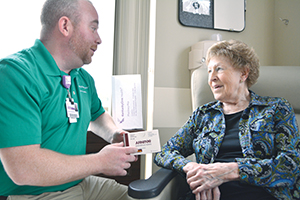Advocates say 340B program is critical to serving vulnerable people
By JULIE MINDA
Through savings and cash captures generated by a federal drug discount program, safety net facilities are helping ensure low-income patients can access health care services.
But pharmaceutical manufacturers say the discount program, the 340B Drug Pricing Program, has grown well beyond its original scope and is distorting drug pricing in the market at large. They have been pressing particularly hard in recent years to have eligibility rules tightened and participation curtailed.

Jeremy Downs, a medication access coordinator for KentuckyOne Health’s Pharmacy Plus Specialty program, meets with cancer patient Etta Koch to discuss her medications. Pharmacy Plus Specialty assists patients with understanding and accessing their prescriptions. KentuckyOne, part of Catholic Health Initiatives, uses 340B savings to fund the program.
Were that to happen, according to a May report from the nonprofit membership organization 340B Health, it is unlikely these safety net facilities could offer the same level of health care and the same access to medications for poor patients that they do today. The report is "340B Program Helps Hospitals Provide Services to Vulnerable Patients."
Catholic safety net hospitals are among the participants in the 340B program. Ministry advocates for St. Louis-based Ascension; Englewood, Colo.-based Catholic Health Initiatives; Irving, Texas-based CHRISTUS Health; Renton, Wash.-based Providence Health & Services, part of Providence St. Joseph Health; and Cleveland-based St. Vincent Charity Medical Center told Catholic Health World 340B is vital to their service to the poor and vulnerable and they've used savings generated through participation in the discount program to provide low-cost drugs to poor patients and to cross-subsidize other services in their safety net facilities. These services include clinics and drug assistance programs for the underinsured and uninsured, oncology services, health education programs, health screening initiatives, care coordination programs and disease management programs.
Ministry advocates have been fighting to preserve the program since its inception in 1992. "The threat is constant — it pops up about every year," said Gabriela Saenz, vice president of advocacy and public policy for CHRISTUS Health. "We have been relaying (to legislators and the public) how important 340B is. It's a direct savings that goes back to the community."
Safety net for the safety net
Passed with bipartisan support in Congress "to stretch scarce Federal resources" and signed by President George H.W. Bush, Section 340B of the Public Health Service Act requires pharmaceutical companies to provide outpatient drugs — biologic drugs, and both branded and generic drugs included — at discounted rates to qualified safety net providers, as a condition of participation in the Medicaid program.
Only nonprofit providers serving significant populations of vulnerable people are eligible to receive the discount, and only their patients can receive drugs purchased through the program. Other qualifications also apply.
According to the Federal Register, 11,530 entities were participating in 340B as of Jan. 1, 2015. These included federally qualified health centers, disproportionate share hospitals, critical access hospitals, children's hospitals, sole community hospitals, freestanding cancer clinics and rural referral centers. Rural referral centers are high-volume hospitals that treat a large percentage of Medicare patients and patients referred from other facilities and clinicians.
Some of these facility types were added to the list of eligible organizations under the Affordable Care Act. According to a 2014 Health Affairs blog post by Billy Wynne, managing partner of consultant TRP Health Policy, one-third of all hospitals in the U.S. take part in 340B. Lisa Smith, CHA senior director of government relations, noted that the growth to this proportion of facilities was due to Congress' expansion of eligibility.

Brudapast
Formula for savings
Under 340B, facilities' outpatient pharmacies purchase drugs at the discounted rate from drug companies to stock their inventory. The 340B facilities also can contract with community pharmacies to dispense the drugs so patients don't have to return to the 340B provider to fill a prescription. The pharmacies can dispense the 340B drugs to all eligible patients, regardless of their payer status. The 340B facilities are not required to pass their discount along to patients, but as nonprofit facilities, they have their individual charity care policies in place to provide services and prescription drugs at no cost or at reduced cost to their uninsured and underinsured patients. In the case of patients insured by private payers, the pharmacies bill the insurer for the medication at a negotiated rate. In the case of patients insured by government payers, the pharmacies bill at the rate determined by the government. The provider facilities calculate the financial benefit as the difference between what they paid for the drug and the reimbursement they received.

Gilbertson
According to information from the Health Resources and Services Administration, participating facilities "can achieve average savings of 25 to 50 percent in pharmaceutical purchases." A Medicare Payment Advisory Commission document says participating facilities "receive a minimum discount of 22.5 percent of the average sales price for drugs paid under the outpatient prospective payment system." Noting that some manufacturers provide steeper discounts than mandated, David Brudapast, director of pharmacy, St. Vincent Charity Medical Center, said that the program is manufacturer-driven. "Without their support it would not exist."
Constant threats
Still, many pharmaceutical companies criticize the program in part because of its growth and the way it is administered. According to information from the Pharmaceutical Research and Manufacturers of America, "the 340B program currently accounts for roughly 6 percent of U.S. branded drug sales … and is valued at roughly $18.5 billion." The group projected that cut will increase to 8 percent and $25.1 billion by 2019."
The American Hospital Association says drug spending under 340B represents about 2 percent of annual drug purchases made in the U.S., a market it values at $374 billion.

Zeitany
In a March policy paper, representatives of that pharmaceutical industry group said 340B eligibility requirements are too lax, and so "340B discounts are becoming a windfall for hospitals," and the program is distorting the drug market. The paper said the 340B program needs stronger rules, stricter eligibility and patient requirements, and better oversight. For instance, the industry group said in the paper that there should be limits on 340B facilities' ability to contract with dispensing pharmacies outside of their network. The group also said participating facilities should be required to demonstrate that patients see a benefit from the discounts. Further, the group said that there should be a tighter definition of who qualifies as a "patient" of a 340B facility.
According to Smith, pharmacy industry lobbyists are advocating that Congress scale back the 340B program or significantly reduce the benefits of the program. Some government agencies are taking heed. HRSA proposed what the industry has termed "mega guidance" about a year ago to address patient eligibility, contract pharmacy arrangements, covered drugs and other program parameters. Because of opposition to that mega guidance, it is unlikely that those guidelines will be finalized, according to Smith. But, she said it is highly likely such attempts to limit 340B will continue.
Ministry advocacy representatives who spoke to Catholic Health World said through advocacy campaigns, letters, calls, in-person congressional meetings and other efforts, they've been opposing attempts to limit the program. They've also been showcasing the benefits of 340B and telling the stories of people helped by 340B.

Rusnaczyk
The advocates who shared their perspectives with Catholic Health World were Saenz; Nick Ragone, senior vice president and chief marketing and communications officer for Ascension; Rachel Tanner, director of regulatory affairs for Catholic Health Initiatives; Joel Gilbertson, senior vice president of community partnerships and external affairs, and Raja Zeitany, vice president and chief pharmacy officer, both of Providence Health & Services; and John Rusnaczyk, senior vice president and chief financial officer, and Brudapast, both of St. Vincent Charity Medical Center.
The advocates from Ascension, CHRISTUS, CHI and St. Vincent said they have been making the case to legislators and the public that reasonable oversight of 340B already exists: Participating facilities must be recertified and prove their eligibility for the program annually. The Providence advocates noted 340B facilities keep comprehensive records of their savings and the use of those savings. According to information from AHA, these records are available to regulators and drug company representatives. The facilities also participate in regular audits by regulators and drug companies.
The St. Vincent advocates noted that increasing compliance documentation requirements would add to costs and cut into the funds they could otherwise use to benefit patients.
Tanner of CHI said, "Our safety net hospitals just want to expand services to our communities — to vulnerable people. And, 340B is a way to do that."
| Discount program helps protect hospitals, patients from steep drug prices A key problem the 340B Drug Pricing Program was designed to address in 1992 was the increasing costs of prescription drugs. That is according to Lisa Smith, CHA senior director of government relations, who said Congress passed the 340B Drug Pricing Program during a time when pharmaceutical manufacturers were ratcheting up their prices — these price hikes were making needed medications unaffordable for providers and patients. Smith said it was legislators' intention at the time the 340B legislation passed that the discounts would help safety net hospitals afford drug costs when stocking their dispensaries, enable them to pass the savings along to low-income patients and allow them to fund other programs to help vulnerable populations. Smith said that while the legislation did not specify exactly how 340B participating facilities were to use their savings, the facilities maintain thorough records documenting that they are staying true to the intent of the program. Gabriela Saenz, vice president of advocacy and public policy for Irving, Texas-based CHRISTUS Health, said 340B helps safety net facilities ensure low-income patients can comply with their care plans. It can be very difficult for patients to take the medications their clinicians prescribe if those patients have no, or limited, insurance coverage for drugs. Nick Ragone, senior vice president and chief marketing and communications officer for St. Louis-based Ascension, said the prices of many drugs have been "escalating out of control," with some drugs astronomically or arbitrarily priced. Raja Zeitany, vice president and chief pharmacy officer, of Renton, Wash.-based Providence Health & Services, agreed, "We're seeing an unprecedented increase in the cost of medicines," in part because of mergers and other consolidation activity among drug companies. Rachel Tanner, director of regulatory affairs for Catholic Health Initiatives of Englewood, Colo., noted, "While there have been great strides with the passage of the Affordable Care Act in reducing the number of uninsured people, there's quite a way to go" when it comes to ensuring everyone can pay their medical and drug costs. Smith said 340B-eligible facilities that purchase drugs at discounted prices have charity care policies that provide for free or reduced cost of all services, including prescription drugs for low-income people. These policies normally base the level of discounting on the particulars of patients' financial situations. David Brudapast, director of pharmacy for Cleveland-based St. Vincent Charity Medical Center, said patients could be responsible for about $280 per month for the medication for an inhaler, absent any discounting. St. Vincent Charity passes its 340B discount along to low-income patients. So, in the example case, it can offer the inhaler medication to low-income patients at about $38 per month. Safety net facilities in accordance with their charity care policies can bring that cost to zero, for very poor patients. Brudapast noted that it's the norm for patients to take multiple drugs, and so, in the absence of financial aid or discounts, the financial burden can be heavy. The 340B program savings help the safety net hospitals ensure patients can afford their medications. A May report from the 340B Health nonprofit organization captures the extent to which those savings assist safety net hospitals in making pharmaceuticals more accessible to their vulnerable patients. The survey report is "340B Program Helps Hospitals Provide Services to Vulnerable Patients." That report says that "when asked how 340B savings increase patient access to drugs, respondents reported using 340B to help their patients in a number of different ways. More than three-quarters — 78 percent — said 340B savings enhance the pharmacy department's ability to serve the under- and uninsured. Seventy-one percent of respondents said the savings increase their ability to provide free or discounted drugs to low-income patients. Sixty percent of respondents said 340B increases the total number of patients their pharmacy serves, with 53 percent saying the program helps them maintain sufficient inventory to meet patient demand. Forty-nine percent said 340B enables their organization to have an outpatient pharmacy at all and keep it properly staffed." |
Copyright © 2016 by the Catholic Health Association
of the United States
For reprint permission, contact Betty Crosby or call (314) 253-3477.